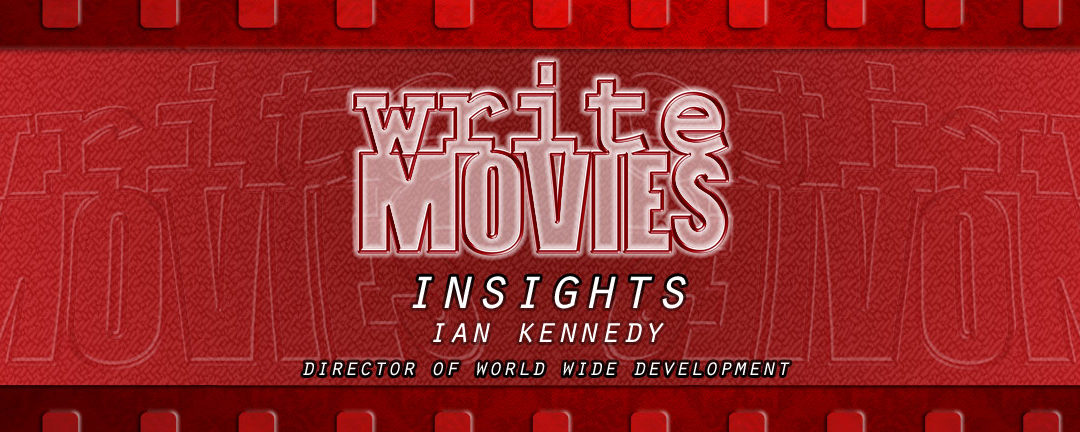
by WriteMovies | Jul 13, 2018 | Ian Kennedy, Writing Insights
How to give Producers, Executives and Publishers what they say they want
When they’re answering questions about what they’re looking for in a script or book, you’ll often hear producers, execs and publishers claiming that the vital quality they look for in writing is the unique voice of the writer. I’ve heard this one a lot, and even when asked what they mean, they’ve rarely given any kind of definition to help writers go away with confidence of what they need to do.
But I read hundreds of scripts a year, watch plenty of productions in lots of genres, and help other writers improve their work every day. So here, I think, is a useful definition of where a writer’s voice comes from in their writing, and how they can “own it” and come across as unique and commissionable.
 Firstly, it’s vital to recognize that all stories show us an aspect of life – hopefully an important or stimulating/entertaining one. (Why does nature reward us with laughter for recognizing things that are counterintuitive, ie funny? Because it’s stimulating and therefore expands our understanding of the world – which better equips us to survive and thrive in it. Comedy is not frivolous, it’s vital.)
Firstly, it’s vital to recognize that all stories show us an aspect of life – hopefully an important or stimulating/entertaining one. (Why does nature reward us with laughter for recognizing things that are counterintuitive, ie funny? Because it’s stimulating and therefore expands our understanding of the world – which better equips us to survive and thrive in it. Comedy is not frivolous, it’s vital.)
So, recognizing the aspect of life you’re exploring in your story, can be expressed in one simple sentence:
“It’s about how life can be (funny/perverse/brutal/arbitrary/beautiful/whatever!)”
You should be able to pick a word or phrase to finish that sentence, which encapsulates the theme, tone and underlying logic of what kinds of thing happen in your story and why they happen. This is a key tool in focusing your script – to ensure that everything that’s in it shows clear choices by the writer which each reveal different, important and often subtle features of that aspect of life which they’ve decided to explore.
What choices you make, and how you present them (i.e. your style, another little-understood word that is often used by producers, execs and publishers), gives your writing its voice.
In the second part of this article, Ian looks in more depth about a writer’s voice, the moral of a story, and how to write a great ending…

by John | Jul 2, 2018 | Ian Kennedy, Writing Insights
In films such as AVATAR, THE PLANET OF THE APES, and even the recent BLADE RUNNER 2049, not to mention TV series like WESTWORLD, we are starting to see that more and more humans as bad guys. In cinema’s constant hunt for new villains, stories reflect how we’ve banished the monsters and hazards from our real world, only to find our worst demons in the mirror and deep inside ourselves.
But why are big Hollywood companies risking hundreds of millions on films where the main villain is, well, us? Why would they risk it all, on us paying to go and blame ourselves for what’s wrong in their fictional worlds? Cinemas are usually the place we go for escapism – to get away from what’s happening on the news. If people are causing so much bad news, why would we want to see that amplified on screen?
In AVATAR, we enter an idyllic eco-topia where all nature – however scary – turns out to be symbiotic, and the threat comes from the human invaders who are determined to ravage the planet for its resources. Our protagonist is human – but lives most of his life in the film as a Nav’i and joins with the planet’s forces against the humans.
In the most recent PLANET OF THE APES trilogy, the human-centric story of the 1968 original – which saw humans struggling to survive in an society ruled by apes – is not merely discarded but inverted. We now find ourselves primarily following the ape CAESAR, who fights to lead his people to safety in a world where they are hated and feared by human beings.
And in BLADE RUNNER 2049, Ryan Gosling’s character – like Harrison Ford’s before him, we finally confirm – is the latest in a long string of replicant assassins employed to kill his own kind, to protect humans from the repercussions of their own creations. The story’s sympathies are clearly with the replicants, not the humans, taking the established Blade Runner theme of ‘what it means to be human’ to a new level.

Volcanoes: less often the villain now than humans.
Just watch a news broadcast, and ask yourself ‘who are the villains here?’, and ‘what’s causing the problems here?’. Apart from earthquakes and volcanos, you’ll usually only get one answer: people. Even when the problem is ‘nature’, like fires and hurricanes, we’re slowly having to admit that actually yeah, we are making things worse, putting ourselves in the firing line when we could live in safer places, and even causing many problems in the first place. A constant flow of research articles and bad-news stories tells us that we humans have enormous influence over the world around us, even if we can’t control it or ourselves.
This is reflected – unsubtly – in AVATAR. Like the earthly colonialists of recent centuries, the humans in AVATAR arrive under the guise of exploitative “trade”, backed up by formidable military intent. Like Vikings and colonialists of our world in past centuries, they are determined to get their way – whether peacefully or by violence. They come to a thriving tropical word, and pillage it for their own needs – sound familiar? The devastation caused by the humans is felt equally by the native species, the animals and even the plants, and this causes some humans to change sides and help the victims, like how people today try to help ‘save the rhinos’. The rest of the movie is totally told from the side of the natives, who our protagonist joins and even becomes.
In the news, we’ve also seen the tribal biases of the past starting to give way to a more balanced view. News stories used to put us solidly on one side of the important divides of the time (humans good, nature dangerous; ‘Western countries’ good, ‘Eastern countries’ bad; ‘civilization’ good, ‘primitive’ cultures bad…). But decades of peace in most of the world have given us the time to take a better look at ourselves, instead of ganging up together against the ‘other’. In fact, these days the news agenda and emphasis is mostly on the victims of war, crimes and abuse (such as sexual harassment or other cruel things done by ‘bad people’ to ‘innocent people’), and we’re much more suspicious than supportive of our leaders and politicians.
In most countries, the news media now is much more likely than before to take the side of victims, and even to fight to tell their story, rather than helping governments and powerful people cover up their abuses and mistakes – even if it often takes famous cases to bring much more widespread everyday abuses into the public eye, such as the Hollywood sexual harassment revelations focusing on the “big name” perpetrators and victims. In the past, history was always written about ‘great men’ who dominated their times. But these days, we emphathize more with the victim than the powerful aggressor. Filmmakers are using this angle in their films to reflect this concern by giving center stage to the victim of a story as opposed to whoever is causing the damage.
Top filmmakers will take the element of escapism and use it to reflect what is going on in the real world. They’re just tapping into the underlying messages behind our modern world and the news we consume every day. These films work because they tap into what we’re preoccupied with, what we now recognize, or think we understand, about the real underlying logic of our world. Filmmakers and production companies have to respond to our modern fears, expectations, preoccupations and feelings in order to tap in to them, get ahead of the curve, and create a cinematic experience that will stick with us. People who aren’t interested in GAME OF THRONES mostly assume it’s ‘just a fantasy story’, when actually it takes the world of fantasy and spins it, to tell vivid stories about some very modern preoccupations – female empowerment, and the brutality of fate – that they’d probably be a lot more interested in.
Why, though, are we happy to go see a film that villainizes humans rather than the aliens or monsters of past films? Well, nowadays people are more open minded than we used to be – peace makes that possible. Where we used to see other cultures as dangerously different, we can now recognize them as the victims of our own culture and values.
THE DARK KNIGHT trilogy mostly works well as a piece of superhero escapism and a reflection of our fears of domestic chaos and terrorism. AVATAR succeeds with its outlandish sci-fi setting and the eco-allegory about rainforests and nature in a symbiotic but fragile harmony.
So, like us, many Hollywood and filmmakers have recognized that humans are the problem – that we are the only real bad guys in this world, now we’ve crushed the monsters and natural environments that created so many threats to us in the past. They are now using this to tell stories from the point of view of humans’ victims, to create compelling stories where we can empathize with the characters victimized by people like us, and recognize the demons and drives within ourselves that cause problems for others in the world.
Then again, maybe it’s just because humans have got so powerful in our own world that we don’t have many other places to turn when we’re looking for villains and excuses for blockbuster mega-stories. Either way, it works.

by John | Jun 22, 2018 | Writing Insights
“Use the Force, Luke.” It’s one of the most iconic phrases in the history of film – and if you haven’t heard it before, you must have been living on a backwater desert planet for the last forty years.
It also contains a valuable lesson for writers. In our latest Writing Insights article, Edward Smith takes a look at how these four words unlock the secrets of the character arc.
And a quick warning if you’ve been living on that desert planet… This article contains spoilers for the original Star Wars trilogy.
We all want to write memorable characters with plenty of depth, and any writer who knows their craft knows that the key to this is the character arc: a process of change and growth that a character undergoes in the course of the story. A character who changes pops off the page and the screen because they are reacting to the world they inhabit, as real people do, whereas a static character is forever nothing more than a two-dimensional collection of traits.
 Yet change just for the sake of change is not enough. The very best character arcs do something more: they equip the hero with the qualities they need to emerge victorious. If your thoughts just went to every training montage you’ve ever seen, you’re on the right lines, but to maximize this concept it needs to be taken further. Skills and knowledge are one thing, but gaining the wisdom to make use of what they know – that is what makes a character’s journey truly satisfying.
Yet change just for the sake of change is not enough. The very best character arcs do something more: they equip the hero with the qualities they need to emerge victorious. If your thoughts just went to every training montage you’ve ever seen, you’re on the right lines, but to maximize this concept it needs to be taken further. Skills and knowledge are one thing, but gaining the wisdom to make use of what they know – that is what makes a character’s journey truly satisfying.
And this is where we come to our key phrase. “Use the Force, Luke.”
In the original Star Wars trilogy, the character arc is applied brilliantly – and differently – in each of the three films. Luke Skywalker undergoes three arcs, each one concluding in a different fashion, showing us how invaluable it is to fully understand this concept.
Luke starts out as a mere farmboy who could never triumph against the might of the Empire. In the course of his adventures, however, he grows into a hero who is entrusted, in the film’s climax, with the task of destroying the Death Star. Yet even then, even with all he has learned, he comes dangerously close to failure, and it takes a reminder from Obi-Wan Kenobi to make sure he doesn’t repeat the mistakes of those who came before him. “Use the Force, Luke.” Luke now has the wisdom to listen – and is rewarded with victory.
Here we find the character arc used to different effect – in fact, in entirely the opposite manner. After going to train with Jedi Master Yoda, Luke leaves before he is ready despite the warnings of his teacher – and, erm… It doesn’t end well for him. At all. This is fundamentally the tragic form, in which the hero fails to learn what they need to succeed – although unlike most tragic heroes, Luke is lucky enough to escape with his life.
Luke actually has little physical impact on the film’s conclusion. While the Rebellion faces off against the Empire (albeit aided by teddy-bears), Luke is locked in a personal battle with Darth Vader and the Emperor, emerging with a moral victory by having the wisdom to know when to stay his hand. While it doesn’t directly affect what happens elsewhere, his arc is nonetheless satisfying because it has a karmic effect; his moral victory is rewarded within the story by simultaneous success for his friends in the Rebellion.
So what can we learn from this? The original Star Wars trilogy demonstrates how a character arc is not merely about growth, but growth with purpose, giving a character not merely the skills they need but also the wisdom to use them. It also shows how an arc can be used in different ways: to give your protagonist success, disaster, or a moral victory.
So whichever kind of character arc you opt for in your script, you now have all the information you need – just make sure you have the wisdom to use it…

by John | May 11, 2018 | Updates, WriteMovies News
After spending just over two years with us, we give our thanks to Jamie White as he pursues pastures new…
It’s been a great couple of years with WriteMovies. I came across their 8-week virtual internship by chance, and that was the portal to so many opportunities, some I wouldn’t have even thought about!
I’ve had the chance to work on script consultancies, pitching materials, meet producers, work on a couple of film projects, write reviews, Insights articles, and, of course, converse with a load of you writers!
Before I sign off, I thought I’d share a few of my highlights from the past couple of years – not all my work, but some real great stuff.
 INSIGHTS: Genre and what it really tells us. This is one of the first articles Ian Kennedy wrote while I was training as a script analyst. I love a good chat on genre, what makes a genre, semantics, syntactics. But this article really helped me to understand the pragmatics of genre (bloody Altman…) and it’s such a good guide for how you should be writing your genre script.Check it out here!
INSIGHTS: Genre and what it really tells us. This is one of the first articles Ian Kennedy wrote while I was training as a script analyst. I love a good chat on genre, what makes a genre, semantics, syntactics. But this article really helped me to understand the pragmatics of genre (bloody Altman…) and it’s such a good guide for how you should be writing your genre script.Check it out here!- GAME OF THRONES Season 7 Review. After a little while, and quite a few script consultancies, I got more chances to write reviews and critical pieces for the site. My GAME OF THRONES season 7 review was one of my earlier reviews, but I think still one of my faves. I got to review one of my favorite shows (though probably its worst season) AND revealed one of my very own conspiracy theories – that Sony were releasing trash like THE EMOJI MOVIE to deter hackers – tell me that doesn’t make sense!Check out my GoT ramblings here.
 Writing for Video Games Articles. From one of my first, to one of my last… My Writing for Video Games articles. I may enjoy the medium of video games more than film and television, so it was a joy to get the chance to write about this topic and give you guys some advice at the same time. I hope you game writers take some inspiration from these articles.Read the first article here.
Writing for Video Games Articles. From one of my first, to one of my last… My Writing for Video Games articles. I may enjoy the medium of video games more than film and television, so it was a joy to get the chance to write about this topic and give you guys some advice at the same time. I hope you game writers take some inspiration from these articles.Read the first article here.- Attending Pitch Meetings. I’ve had the rare and exciting opportunities to attend several meetings with film producers to talk about the prospects of several of our winning scripts coming to life. Sure, I was the sidekick to our Director of World Wide Development, Ian Kennedy, but attending these sorts of meetings have been vital to my development. I got to see first hand how you should be pitching, what sort of language and tactics to employ. A great opportunity and a great experience. Loved it!
 Reading your scripts… From my start with the internship, to the very end, the one constant has been the chance to read, analyze and judge the scripts you guys have sent in for contests and consultancies. Seriously, some of these scripts I could really visualize, some to an extent I could imagine the cinematography to their inevitable film. Some really were THAT good. I wish the writers that we’re developing now get to realize their dreams – if just one of these scripts gets made, that would truly make my time with WriteMovies a success (not that it hasn’t been anyway!)
Reading your scripts… From my start with the internship, to the very end, the one constant has been the chance to read, analyze and judge the scripts you guys have sent in for contests and consultancies. Seriously, some of these scripts I could really visualize, some to an extent I could imagine the cinematography to their inevitable film. Some really were THAT good. I wish the writers that we’re developing now get to realize their dreams – if just one of these scripts gets made, that would truly make my time with WriteMovies a success (not that it hasn’t been anyway!)

by John | Apr 30, 2018 | Writing Insights
The opening ten to twenty pages of your script are so important in really selling top execs and producers your script. If it doesn’t grab ’em, then you got no chance. The first page is the most important of those early pages. The first impression of your script really matters. Here are 5 writing tips from us on how your opening page can stand out and shine from the rest…
 1. STRIKING VISUALS OR AUDIO
1. STRIKING VISUALS OR AUDIO
Find a striking image, sound, or quick sequence of events to start on. If you can immediately make the reader visualize or “hear” your script, it makes it so much easier for them to visualize the rest of the story.
2. NAIL THE GENRE
You need to immediately establish the genre. In some ways, you can combine this with Tip #1 (sci-fi is a great genre for this). But sometimes you need to immediately set the tone of a tense horror, or the light-heartedness of a rom-com with how you write, and how your characters act.
You got a sci-fi? Show us some cool advanced tech. Horror? Give us a murder scene. Rom-com? Give us a visual that we associate with romance (sunsets, weddings, restaurants) and throw some funnies in there.
3. AVOID THE EARLY ICK
You don’t wanna put off the reader with anything yucky. Whatever happens on page one sticks with the reader throughout the rest of the script. You don’t want something icky to stick with them, do you? You have to make us care before you hit us with anything vicious, sick or distasteful
Generally, keep things subtle and ambiguous. If you want to set up a murder, avoid showing and describing the actual act with too much detail.
4. PLEASE NO VOICE-OVERS
You wanna do some world-building, set up the story, tell us all about the characters. I get it. But please, please, please try and avoid voice-overs. they just ooze with laziness and lack of creativity. Ditto for title cards, by the way.
Same goes for info-dump title cards (at the beginning and end of the script – especially for biographical stories…) Your script should be providing all the necessary info the story needs to. These types of voice-overs and title cards should not be necessary for a good script.
 5. TRY TO AVOID DIALOGUE
5. TRY TO AVOID DIALOGUE
If you don’t start with a strong image, then you’re probably beginning with a dialogue-heavy exposition scene. Bad. If you can effectively open your script without dialogue then you’ll more likely hook whoever’s reading your script.
These all fit in with each other, too. If you’re avoiding dialogue, then you’re avoiding voice-overs. Your striking image can also visually announce the genre of your script and set the tone; a horror film can start with a gruesome murder, for example. Don’t overdo it on the visuals, though. Don’t give us something too visceral and gratuitous – that’ll either put us off with the ick, or give too much of the game away. It’s a delicate balance to manage, but such good practice to get into.
Pretty straight-forward writing tips, right? Seems so obvious now that you see these written down, but you will not believe how many writers fall into the trap of lazy voice-overs and give us no idea of what the genre is.
Just remember to KISS – keep it simple, stupid.
See what we would say about the opening page of your script (and all the other pages!) with our Script Mentoring services…

by John | Jan 20, 2018 | Writing Insights
By guest author Calix Lewis Reneau, writer/director of www.childthemovie.com and producer and creative of features, television, print, music, and new media.

|
|
“You’ve probably heard the writing advice to “murder your darlings.” This means to be ruthless in deleting clever writing that doesn’t serve the greater purpose of your work. I’ve learned that a writer must take this a step further. To get the best story on the page, we must be willing to kill the story in our minds.
If you’ve ever tried to explain a dream you’ve had after waking up, then you can understand this. In your dream everything was vivid, real, logical, connected – a complete story. But as it immediately fades, even the simplest narrative detail slips from your grasp. Worse, when you can remember the precise details, they sound pedestrian and disconnected in the telling.
 The same is true of the story you have in your head which you’re so passionate to tell. For reasons too complex to relate in a short article, we humans don’t think in a simplistic, connected, linear fashion. On simple fact can help reveal to that complexity: there are more than one hundred trillion synapses (neural connections) in your brain, at a minimum. That’s a thousand times more than the number of stars in our galaxy. And your connections in your brain are unique in all of history to you alone. What you think, what you see, what you feel, what you dream – your story – has never been before, and will never be again. The same is true of the story you have in your head which you’re so passionate to tell. For reasons too complex to relate in a short article, we humans don’t think in a simplistic, connected, linear fashion. On simple fact can help reveal to that complexity: there are more than one hundred trillion synapses (neural connections) in your brain, at a minimum. That’s a thousand times more than the number of stars in our galaxy. And your connections in your brain are unique in all of history to you alone. What you think, what you see, what you feel, what you dream – your story – has never been before, and will never be again.
The story you want to tell is meaningful to you for the same reasons you are so invested in your dream when you’re having it at night. It’s immediate. It’s real. It’s consists of more than what can be put in words on a page, or images on a screen. The story is made up of your unique emotional connection to the material which drives you. It finds meaning in your personal history. It finds context in your life and worldview.
In short, the story in your mind is your story alone. It can never be anything more than that.
As writers, we’re compelled to share that story, impossible though it might be to do so. That’s where the skill, the talent, the hard work come in. The job of the writer is not to tell the story in our heads. It’s to translate the unique inner experience into a tangible form which will hopefully lead others to a similar journey. To laugh, to cry, to learn, to grow, or just to be entertained.
This translation requires that we understand the connective elements that we share. Functional communication requires two parties: someone to say something, and someone to hear it. You have something you want to say, need to say. As a writer, the fundamental task at hand is to say it in a way which will clearly give your intended audience what you want them to have. It’s no use to complain that others can’t enjoy the dream you had last night in the same fashion as you did. The hard work that sets successful writers apart from all others is the learned ability based on innate talent to take that powerful inner experience and craft something that leads others to their own unique powerful inner experience that is reflective, that is connected through our common humanity.
 To do this, we must be ruthless in “murdering our darlings” at the most fundamental level. This means recognizing from the start that the story in our heads can’t ever function as the story we want to tell. But that’s okay, because once we accept that, the story in our heads can become the powerful inspirational genesis for the stories we put out into the greater culture using our skill and talents of translation as writers. Your focus, passion, ability, and self-discipline is the refiner’s fire which will burn away the dross of self so you can change the world with the stories you have to tell.” To do this, we must be ruthless in “murdering our darlings” at the most fundamental level. This means recognizing from the start that the story in our heads can’t ever function as the story we want to tell. But that’s okay, because once we accept that, the story in our heads can become the powerful inspirational genesis for the stories we put out into the greater culture using our skill and talents of translation as writers. Your focus, passion, ability, and self-discipline is the refiner’s fire which will burn away the dross of self so you can change the world with the stories you have to tell.”
Calix is a full-time creative working in features, television, print, music, and new media. He has written professionally for just about every type of media imaginable, including a stint as a top-selling greeting card writer. These days he spends most of his time juggling projects at his own production company which are in various states of entropy, from nascent ponders to completed features winding their way through post production and into distribution. His job title at Calix8 Productions – “iconoclast gadfly” – pretty much explains his approach to work, life, and the mysteries of the universe.
You can learn more about Calix at his poorly-maintained personal website – www.calix8.com – and see the trailer to his most-recent completed feature film (as writer/director) at www.childthemovie.com. |

by John | Dec 29, 2017 | Ian Kennedy, Updates, Writing Insights
In Ian’s previous articles, we’ve seen how technologies of the future (and present!) can quickly invalidate our future-writing efforts. But the easiest thing for writers to misjudge is how people themselves will be different, within the future worlds we create.

We may be very happy to accept any implausible or kitsch elements in your future-writing if they make for a more vivid and exciting world than our own – but if people (and the way they live) don’t seem to be changed, then you’re missing out on one of the massive appeals of writing the future: that it offers audiences a vision of how we could be different if we lived in such a different world, and how we could make different choices in life if they see life in that new light. The future is, ultimately, a place to play out our dreams of what life today really could, or should, look like, if only we had the chance. Future-writing creates a rare, neutral space in which to play out our conflicting visions, and fears, for the present and the future, all within the safety net of someone else’s story about a totally different world to our own.
If our technologies – or destructive tendencies – smash the way of life we know, then the post-apocalyptic visions of many popular future-stories (MAD MAX, THE BOOK OF ELI, etc etc) may prove a good guide – because people whose lives are a step backwards from ours, are likely to play out in ways that life and history can help us recognize today. So I’ll focus instead on how people are likely to change if that doesn’t happen, and if other historic trends continue instead. Here are some trends I’ve noticed which are extremely likely to continue to change our personalities and choices. If you’re looking for subjects to inspire your next script, the answer might be somewhere here!
 Ever-presents of human nature, like family bonds and tribalism and attraction, will continue to forge our key relationships and allegiances and priorities – far more than rational reasoning would like to admit. We will never actually want to be “one unified world community” – whatever we might tell ourselves, we’ll choose to keep dividing ourselves into tribes and sub-tribes. I’ll write about these in more detail another time.
Ever-presents of human nature, like family bonds and tribalism and attraction, will continue to forge our key relationships and allegiances and priorities – far more than rational reasoning would like to admit. We will never actually want to be “one unified world community” – whatever we might tell ourselves, we’ll choose to keep dividing ourselves into tribes and sub-tribes. I’ll write about these in more detail another time.- Almost every medical condition will become treatable, and most will be fully curable. People will develop ever-more-perfectionist expectations of themselves and others for their health, capacities and looks. Technologies will become better integrated within people’s bodies too, with far-reaching implications, first for treatments and then for enhancements. These trends will create losers as well as winners, mainly due to economic factors that give or limit people’s access to these treatments.
- Almost every conceivable aspect of life and the world will become connected to, or monitored by, our grand digital networks. Going ‘off the grid’ will get harder and harder, with important consequences for thriller stories in particular – many scripts we receive feel quite dated to me already with this in mind. The ‘internet of things’ will pose significant risks for privacy and security, with our everyday lives utterly interconnected with single networks that put us all at risk of having our lives invaded.
- The culture war of the 21st century will continue to be that between fundamentalism (of all kinds), against relativism and tolerance. Western countries may need to start reining in more of the free-for-alls that have risen since the 1960s – because if we can’t, fundamentalism may offer many people a much more reassuring vision than the issues that they perceive in the world around them. I notice that few sci-fi writers want to embrace religious believers into ‘their’ visions of the future. But those people will be there anyway – how will they feel about the world they’re living in? How many of those wonderful 1960s visions of the 21st century (THUNDERBIRDS, etc etc) predicted a global surge in religious fundamentalist terrorism? Perhaps, comparing modern trends to the worldview and expectations of religious fundamentalists, we should have seen it coming.
 War will also be designed to keep actual human beings (from our own country, anyway) completely remote and safe from the intrinsic dangers of the battlefield. This is already basically the case for headline conflicts, we just haven’t invented a way to occupy hostile territories without ground troops yet. I reckon the next major war between global powers will be won or lost by technology (such as cyberattack) within hours without a single bullet being fired. All this has big implications for action stories – where we want to see our heroes put their own lives on the line for the story, without getting immediately cut down by some drone-robot fly.
War will also be designed to keep actual human beings (from our own country, anyway) completely remote and safe from the intrinsic dangers of the battlefield. This is already basically the case for headline conflicts, we just haven’t invented a way to occupy hostile territories without ground troops yet. I reckon the next major war between global powers will be won or lost by technology (such as cyberattack) within hours without a single bullet being fired. All this has big implications for action stories – where we want to see our heroes put their own lives on the line for the story, without getting immediately cut down by some drone-robot fly.- Power and knowledge and the ‘moral high ground’ will continue to decentralize away from governments and religious institutions, through technology and the continued trend towards individualization of modern job roles. Improved technologies will also make it harder and harder for anyone to maintain lies and secrets (and foment conspiracies successfully). However, at the same time, we will all be relying on common technologies and platforms, such as the internet, ever more, and so the risks will grow that would-be tyrants and hostile powers will turn our powers and everyday devices upon us.
- Supposedly ‘ignorant’ patterns of thought and behaviour (from racism to superstition to religious bigotry) will continue to decline, but will keep persistently recurring in new forms in every generation, and the continued migration and tourism of people to other countries will ensure that old issues like these will never become ‘a thing of the past’ anywhere.
- Controversial cases that come to light in the news will continue to stiffen public opinion and the law against people who create injustices and avoidable suffering for other people (from our own culture or countries!). Proliferating devices like smartphones will continue to make it easier for victims and others to record and prove that these injustices are happening – albeit via networks and platforms that many governments and others may be demand to control.
- People will continue to intensively map, scan and explore any areas of life or the universe that could be described as ‘the unknown’. Fewer people will believe in the possibilities that rely upon it (such as magic, monsters, aliens and direct ‘divine intervention’) – though interest in stories about them might conversely rise as a result of their ‘otherness’! But people will continue to interpret things in the ways that feel most natural to themselves, so don’t expect religion and superstition to die off anytime soon.
 Automation and robotizing of all aspects of life will continue to render more and more job roles obsolete. The more this continues, growing numbers of people may lean towards anti-globalization movements, backward-looking politicians or authoritative voices. Meanwhile educated, versatile people may find themselves in a minority for remaining economically active and having a secure sense of their own identity and purpose in the world. Which impacts significantly upon my next point…
Automation and robotizing of all aspects of life will continue to render more and more job roles obsolete. The more this continues, growing numbers of people may lean towards anti-globalization movements, backward-looking politicians or authoritative voices. Meanwhile educated, versatile people may find themselves in a minority for remaining economically active and having a secure sense of their own identity and purpose in the world. Which impacts significantly upon my next point…- While globalization will continue to make countries ever more interdependent, but sociopaths will continue to find ways to take power (click HERE to understand what I mean by ‘sociopath’ – it’s perhaps a much more widespread personality type than you realize). Pacifism will remain naïve in the face of this, and the proliferation of technologies that can empower them in new and ever-more-pervasive ways. But in economic terms, centralized nation-states will be unable to keep up with those that don’t try to maintain full control of all aspects of the economy.
- The environment everywhere will continue to be carved up and predominated by human activity at an escalating rate, until technological changes make it possible (and convenient) to live far more efficiently than people currently choose to. Changes of power and circumstance will keep upsetting whatever is agreed to protect the environment; people will have to innovate within their own spheres of influence instead, to make any difference, but this won’t change the overall direction of travel. Anything that environmentalists achieve can be easily reversed by breakdowns in international or local law and order, and crippling population pressures on resources, not to mention reverses of government policy.
Here are some things that could go either way, but won’t just stay the same.
- Our attitudes towards the suffering of other people (especially those we don’t have any connections to) and animals or nature. – Humans would mostly like to be compassionate, but they would also like to be able to take things for granted so they can get on with life uninterrupted. Economics and politics play a massive role here – and people who are struggling to maintain their way of life have a much less compassionate attitude towards outsiders and those whose inferiority makes their own way of life possible.
- The spread of decentralized media platforms such as the internet means new challenges for debate and decisionmaking. ‘Truth’ and ‘lies’/’fake news’ are heading for an interesting clash which may set in law what ‘truths’ or ‘accuracy’ can be stated or published, and what the punishments will be for those who go against that. This will be an interesting showdown between delusionals, tyrants, sociopaths and their allies (click HERE to see who I mean), and the institutions of the 20th century liberal West. It may have different results in different places, influencing the ideological wars of the century ahead.
Alright, so there’s my two cents. Hope it helps you future-proof your writing and keep clear of some of the mistakes that we see so often. Maybe you can even find the central question of your next script here! If so, let us know where you take it and how you get on…
Read more of Ian’s insights right here and check out the previous entries to this future proofing series…
© WriteMovies 2017. Exclusive to WriteMovies – To syndicate this content for your own publication, contact ian (at) writemovies dot-com.

 Firstly, it’s vital to recognize that all stories show us an aspect of life – hopefully an important or stimulating/entertaining one. (Why does nature reward us with laughter for recognizing things that are counterintuitive, ie funny? Because it’s stimulating and therefore expands our understanding of the world – which better equips us to survive and thrive in it. Comedy is not frivolous, it’s vital.)
Firstly, it’s vital to recognize that all stories show us an aspect of life – hopefully an important or stimulating/entertaining one. (Why does nature reward us with laughter for recognizing things that are counterintuitive, ie funny? Because it’s stimulating and therefore expands our understanding of the world – which better equips us to survive and thrive in it. Comedy is not frivolous, it’s vital.)










